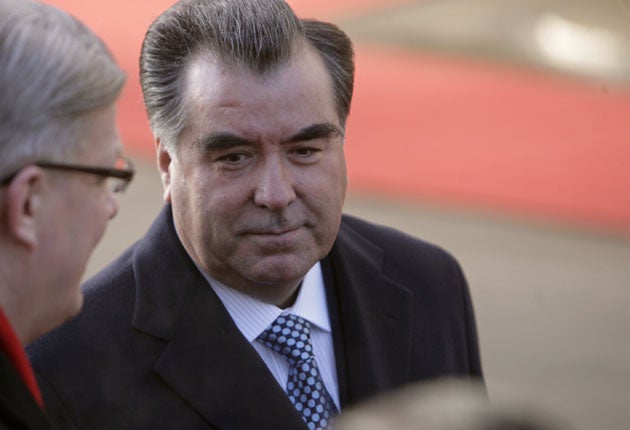Tajikistan police shave beards of 13,000 men 'to tackle radicalism'
The country's police also revealed that 1,773 Muslim women had been persuaded to stop wearing the hijab

Your support helps us to tell the story
From reproductive rights to climate change to Big Tech, The Independent is on the ground when the story is developing. Whether it's investigating the financials of Elon Musk's pro-Trump PAC or producing our latest documentary, 'The A Word', which shines a light on the American women fighting for reproductive rights, we know how important it is to parse out the facts from the messaging.
At such a critical moment in US history, we need reporters on the ground. Your donation allows us to keep sending journalists to speak to both sides of the story.
The Independent is trusted by Americans across the entire political spectrum. And unlike many other quality news outlets, we choose not to lock Americans out of our reporting and analysis with paywalls. We believe quality journalism should be available to everyone, paid for by those who can afford it.
Your support makes all the difference.Police in Tajikistan shaved the beards of nearly 13,000 men and convinced 1,770 women to stop wearing the hijab in the last year in a bid to tackle ‘foreign influences’, it has been reported.
At a press conference yesterday, the Muslim-majority central Asian country’s law enforcement services revealed that the facial hair of 12,818 men had been “brought to order” for being “overly long and unkempt”, according to the Radio Liberty news site.
Bahrom Sharifzoda, the head of the country’s Khatlon region’s police force, also announced that officials had closed 162 shops selling traditional Muslim clothing, including the women’s headscarf, and that 1,773 females had been persuaded to ditch the garment.
The measures are part of the secular leadership’s efforts to battle apparent “radicalism” and “unwelcome traditions from neighbouring Afghanistan”, according to Aljazeera.
The news site reports that, in recent months, the country’s parliament has voted to ban Arabic-sounding foreign names and marriages between first cousins, while its Supreme Court has banned the country’s sole Islamic political party, the Islamic Renaissance Party of Tajikistan.
President Emomali Rahmon, who has been in power since 1992, has worked to promote secularism in the country and has been seen to discourage beliefs and practices that could cause the country instability.
In December, Rahmon and his family were granted lifetime immunity from prosecution, with the parliament officially giving him the title of “leader of the nation” and the “founder of peace and national unity of Tajikistan”.
The republic of Tajikistan became independent from the Soviet Union in 1991.
Last May, the country’s national security suffered a setback when Colonel Gulmurod Khalimov, commander of the special-purpose police unit of the Interior Ministry, reportedly joined the Islamic State group.
Join our commenting forum
Join thought-provoking conversations, follow other Independent readers and see their replies
Comments